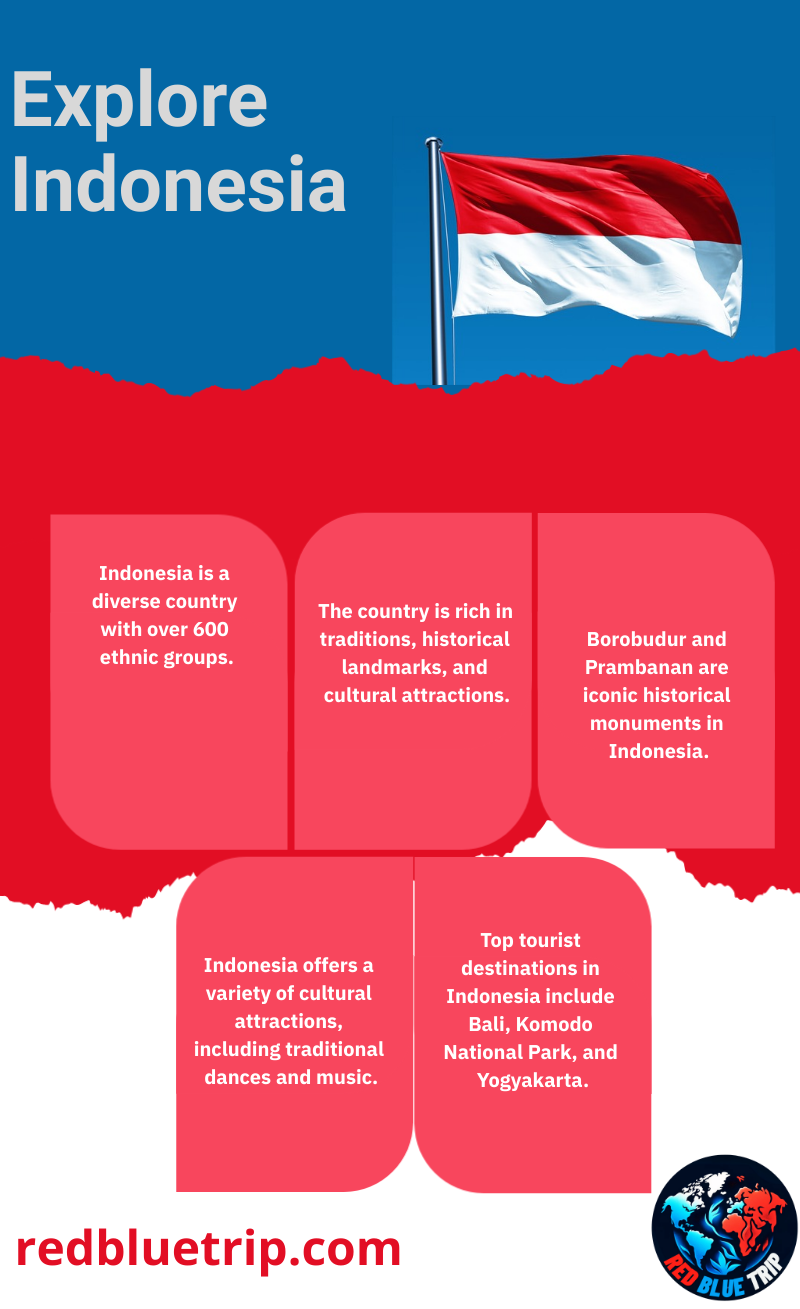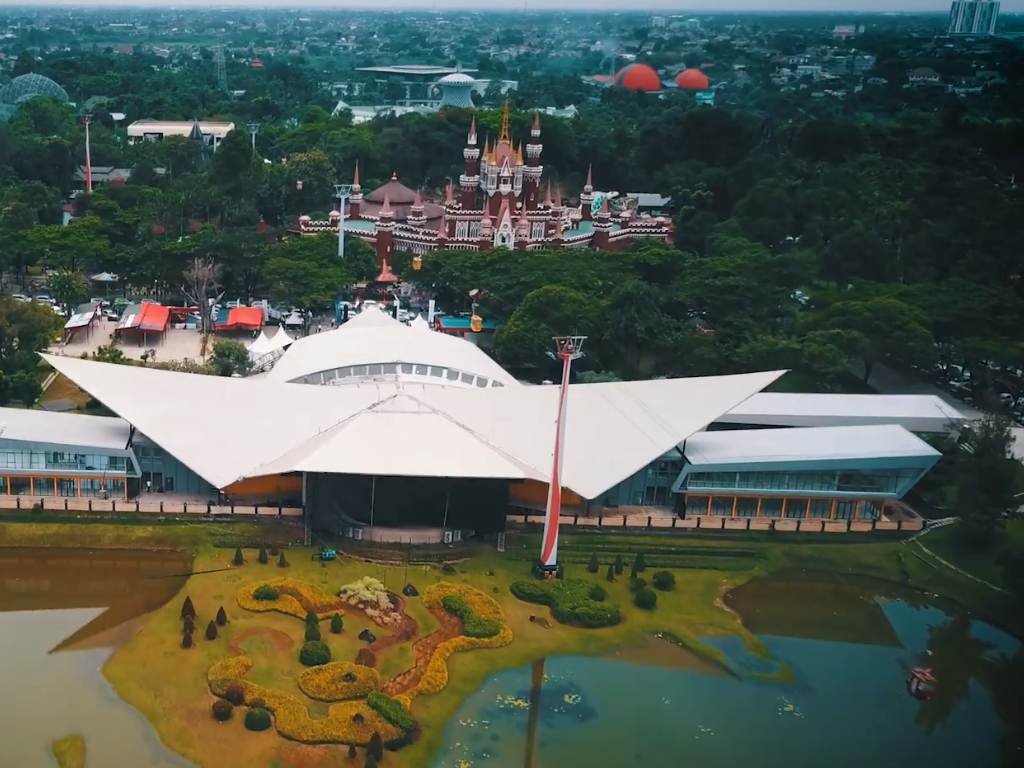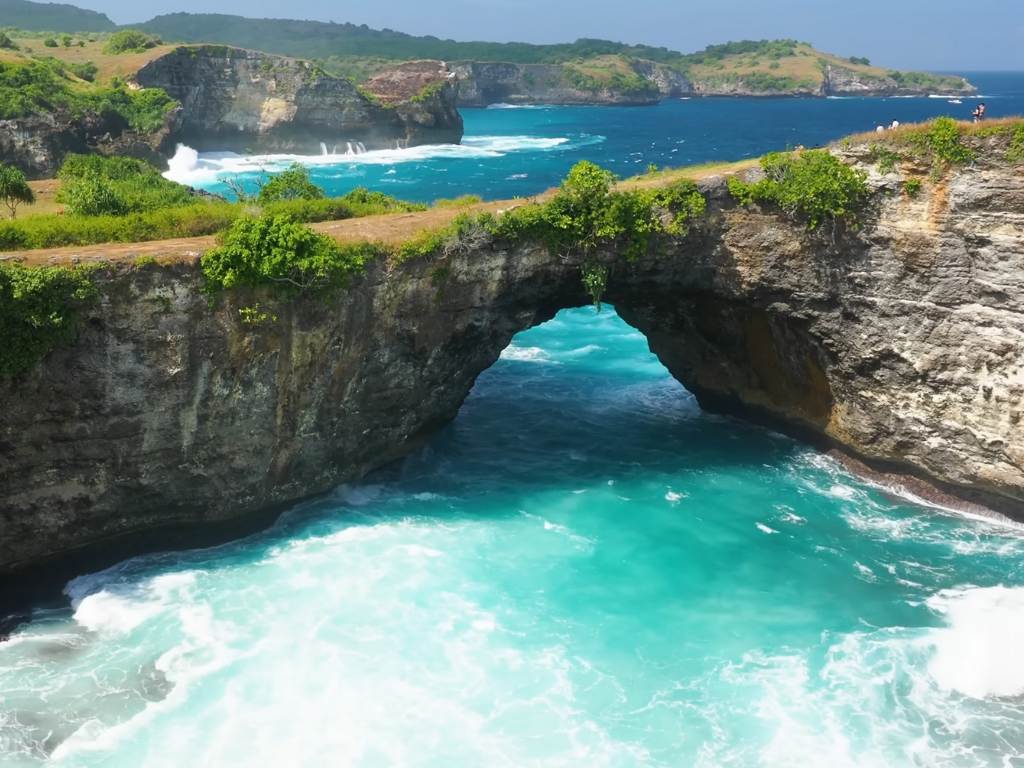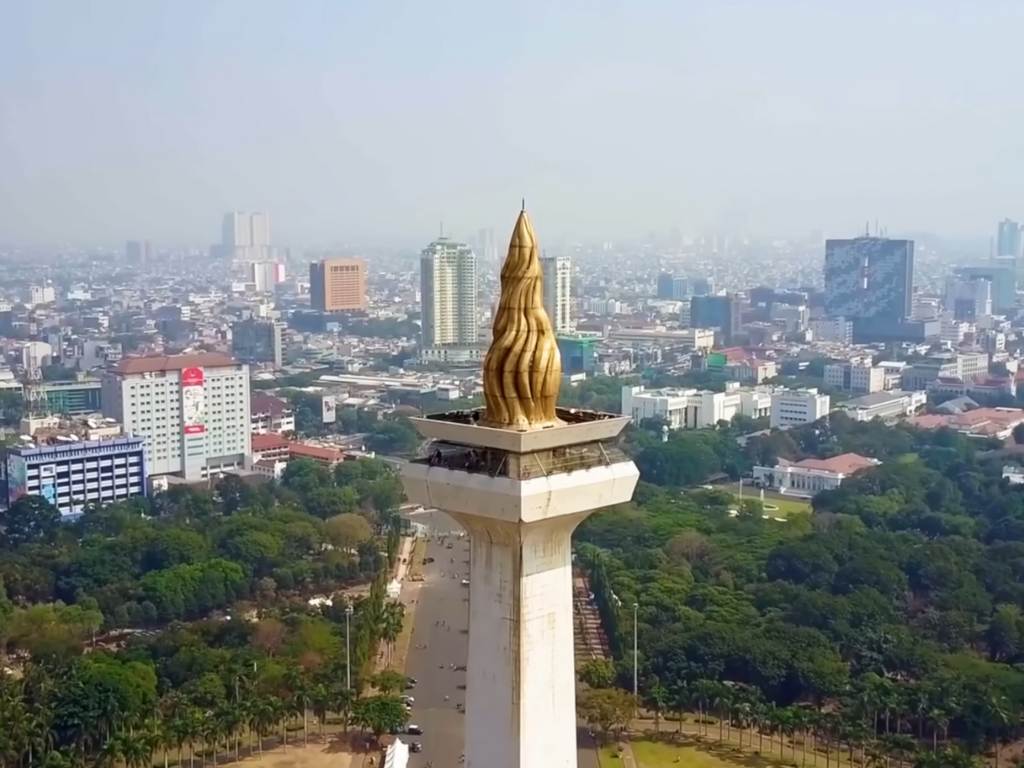Did you know that Indonesia is home to over 600 ethnic groups, making it one of the most diverse countries in the world? This vibrant nation is a melting pot of traditions, historical landmarks, and cultural attractions waiting to be discovered.
Imagine yourself strolling through the bustling streets of Jakarta, where the sights and sounds of traditional markets fill the air. As you explore the ancient temples of Borobudur and Prambanan, you can’t help but feel the weight of history on your shoulders. And as you immerse yourself in the colorful performances of traditional dances, you can’t help but be captivated by Indonesia’s rich cultural heritage.
Whether you’re interested in witnessing timeless cultural practices, exploring architectural marvels, or indulging in the vibrant arts and crafts, Indonesia has something for every traveler. From the serene beaches of Bali to the natural wonders of Komodo National Park, this breathtaking country will leave you in awe.
Join us on this Indonesia Culture & Heritage Guide & Travel Information as we take you on a journey to unravel the traditions, historical landmarks, cultural attractions, and must-visit destinations that make Indonesia a truly unique travel experience.

Indonesian Traditions: Uncovering Timeless Cultural Practices
Indonesia is a country renowned for its vibrant and diverse traditions, rooted in centuries-old customs and practices. From elaborate ceremonies to colorful festivals, each region of Indonesia has its own unique cultural identity.
One of the most iconic traditions in Indonesia is the Sundanese Angklung performances. Angklung is a traditional musical instrument made of bamboo tubes, each producing a distinct note when shaken. The harmonious melodies produced by the Angklung are mesmerizing and showcase the mastery of Sundanese traditional music.
Another cultural treasure is the Pasar Baru Trade Center in Bandung. This historical marketplace has been a hub of trade and cultural exchange for decades. The narrow streets lined with shops and stalls offer glimpses into the rich trading traditions of Indonesia.
“The vibrant atmosphere and bustling energy of Pasar Baru Trade Center make it a must-visit destination for both locals and tourists. It’s a place where tradition and modernity coexist harmoniously.”
Cultural festivals are an integral part of Indonesia’s heritage, celebrating the country’s diversity and traditions. One such festival is the Singkawang Tatung Parade, held annually in Singkawang, West Kalimantan. The parade showcases the performance of Tatungs, individuals believed to be possessed by spirits, who engage in captivating rituals and dances.
The Penti Sacred Rituals in Wae Rebo, Flores Island, are another cultural festival that highlights the mesmerizing spiritual practices and customs of Indonesia. During Penti, the local community comes together to honor their ancestors, with rituals that involve traditional dances, offerings, and prayers.
Indonesian Traditions: Key Highlights
- The Sundanese Angklung performances showcase the rich musical heritage of Indonesia.
- The Pasar Baru Trade Center in Bandung offers a glimpse into Indonesia’s historical trading traditions.
- The Singkawang Tatung Parade brings together captivating rituals and dances performed by the Tatungs.
- The Penti Sacred Rituals in Wae Rebo honor ancestors through traditional dances, offerings, and prayers.
These traditions and cultural practices are the essence of Indonesia’s cultural heritage, providing a window into the customs and beliefs that have shaped the country’s identity throughout history. They are a testament to the resilience and richness of Indonesian culture.
| Cultural Practice | Location | Description |
|---|---|---|
| Sundanese Angklung Performances | West Java | The performance of traditional music using the Sundanese Angklung instrument. |
| Pasar Baru Trade Center | Bandung, West Java | A historical marketplace showcasing traditional trading customs. |
| Singkawang Tatung Parade | Singkawang, West Kalimantan | A festival featuring captivating rituals and dances performed by the Tatungs. |
| Penti Sacred Rituals | Wae Rebo, Flores Island | A ceremonial event honoring ancestors through traditional dances, offerings, and prayers. |
Historical Landmarks: Exploring Indonesia’s Architectural Marvels
Indonesia is home to a plethora of historical landmarks that not only bear witness to its rich history but also showcase its remarkable architectural wonders. These iconic buildings and cultural heritage sites provide a fascinating glimpse into the past, making them must-visit destinations for any traveler seeking to immerse themselves in Indonesia’s captivating history and culture.
One of the most breathtaking historical landmarks in Indonesia is the Borobudur Temple. Located in Central Java, this magnificent Buddhist temple complex is a UNESCO World Heritage site and a true architectural marvel. The temple’s intricate carvings and impressive stone structures reflect the grandeur of ancient Indonesian architecture, leaving visitors in awe of the craftsmanship that went into its creation.
Another notable landmark is the Istiqlal Mosque in Jakarta, which holds the distinction of being the largest mosque in Southeast Asia. Its imposing architecture and elegant design are a testament to Indonesia’s Islamic heritage. The mosque serves as a place of worship and a symbol of religious harmony in the bustling capital city.
The Prambanan Temple is yet another architectural marvel that cannot be missed. This Hindu temple complex, located in Yogyakarta, is renowned for its towering spires and intricate stone carvings. Built in the 9th century, it stands as a testament to the rich cultural heritage of Indonesia and the enduring influence of Hinduism in the region.
“Indonesia’s historical landmarks are not mere structures; they are living testaments to the rich history and cultural heritage of this diverse nation. Exploring these architectural marvels is like stepping back in time and witnessing the legacy left behind by our ancestors.” – Indonesian Cultural Heritage Expert
These are just a few examples of the countless historical landmarks that can be found in Indonesia. Each site tells its own unique story and offers a glimpse into the country’s past. From ancient temples to iconic buildings, these cultural heritage sites are a true treasure trove for history enthusiasts and architecture admirers alike.
Cultural Attractions: Immerse in Indonesia’s Arts and Crafts

Immerse yourself in the vibrant arts and crafts of Indonesia, as the country offers a plethora of cultural attractions that showcase its rich heritage. From traditional dances and music to fascinating museums and craft workshops, there’s something for every art enthusiast to explore. Indulge your senses and delve into the captivating world of Indonesian cultural attractions.
Experience the Taman Mini Indonesia Indah (TMII)
Located in Jakarta, the capital city of Indonesia, the Taman Mini Indonesia Indah (TMII) is a cultural tourism complex that celebrates the nation’s diversity. Step into a world of traditional Indonesian houses and iconic buildings that represent different regions. Witness the arts and crafts of Indonesia come to life through various cultural performances held within the complex.
At the museum in TMII, visitors can marvel at an impressive collection of Indonesian cultural and historical artifacts. From intricately carved masks to beautiful textiles and ancient relics, the museum provides a fascinating insight into the country’s rich artistic heritage.
Traditional Dances and Indonesian Music
Indonesia is renowned for its diverse traditional dances, each reflecting the unique cultural practices of different regions. From the elegant Balinese Legong dance to the energetic Javanese Reog Ponorogo dance, these performances captivate audiences with their mesmerizing movements and colorful costumes. Experience the grace and beauty of these traditional dances as they transport you to a world steeped in Indonesian culture.
Indonesian music is rich and diverse, fusing traditional instruments with modern sounds. The high-energy Gamelan orchestra, featuring bronze gongs and xylophones, is a quintessential Indonesian musical experience. The soothing melodies of traditional Javanese and Balinese music evoke a sense of tranquility, while modern Indonesian music reflects the country’s contemporary music scene.
Craft Workshops and Indonesian Museums
Delve deeper into the world of Indonesian arts and crafts by participating in craft workshops. Learn traditional techniques such as batik painting, woodcarving, and weaving from skilled artisans. These workshops offer a hands-on experience, allowing you to create your own unique piece of Indonesian craftsmanship to take home as a memento.
Indonesia is also home to a multitude of museums that showcase the country’s artistic heritage. From the National Museum of Indonesia in Jakarta to the Agung Rai Museum of Art in Ubud, Bali, these museums house vast collections of historical artifacts, contemporary artworks, and cultural treasures. Explore the corridors of these cultural institutions and gain a deeper understanding of Indonesia’s artistic legacy.
Must-Visit Destinations: Discovering Indonesia’s Top Tourist Spots

Indonesia is renowned for its breathtaking destinations that captivate travelers from around the globe. Whether you seek stunning beaches, cultural heritage sites, or natural wonders, Indonesia has it all. Take a journey through this remarkable country and explore its top tourist destinations that showcase the diverse beauty of Indonesia.
Bali: The Island of the Gods
Located in the Indonesian archipelago, Bali is a paradise for beach lovers and culture enthusiasts alike. Its sun-kissed shores, crystal-clear waters, and vibrant nightlife make it one of the best places to visit in Indonesia.
Immerse yourself in the rich Balinese tradition and visit ancient temples like the Uluwatu Temple, famous for its dramatic cliffside setting. Witness mesmerizing dance performances and indulge in traditional Balinese cuisine. Bali truly lives up to its reputation as the “Island of the Gods.”
Komodo National Park: A Prehistoric Wonder
Home to the iconic Komodo dragons, the Komodo National Park offers a unique wildlife experience. Dive into the crystal-clear waters surrounding these islands and explore vibrant coral reefs teeming with marine life.
Snorkeling and diving enthusiasts will revel in the opportunity to spot manta rays, turtles, and an array of colorful fish. The prehistoric world of the Komodo dragons and the spectacular underwater realm make the park one of Indonesia’s top tourist destinations.
Yogyakarta: A Cultural Capital
Yogyakarta, often referred to as Jogja, is the cultural heart of Java island. This bustling city is known for its ancient temples, including the magnificent Borobudur and Prambanan temples.
Explore the Sultan’s Palace, witness traditional Javanese dances, and immerse yourself in the thriving art scene. Jogja’s vibrant ambiance and rich cultural heritage make it a must-visit destination for anyone seeking to discover the soul of Indonesia.
Lombok: Pristine Beaches and Serene Landscapes
Lombok, located just east of Bali, offers a more tranquil and laid-back experience for beachgoers. Its pristine white sandy beaches, turquoise waters, and breathtaking sunsets create a serene atmosphere.
Explore the stunning Gili Islands, known for their fantastic snorkeling and diving spots. For nature enthusiasts, Mount Rinjani offers the opportunity to embark on a challenging trek to its summit, rewarded with stunning panoramic views. Lombok’s untouched natural beauty makes it a hidden gem for those seeking relaxation and outdoor adventure.
Raja Ampat: A Natural Wonderland
For nature lovers and diving enthusiasts, Raja Ampat is an unparalleled natural wonder. This archipelago boasts stunning islands, crystal-clear waters, and vibrant coral reefs. Dive into the ocean depths and marvel at the kaleidoscope of marine life, including the rare and exotic species found only in this region. Experience the untouched beauty of Raja Ampat and witness the remarkable biodiversity that earned it the reputation as one of the world’s best dive sites.
| Destinations | Highlights |
|---|---|
| Bali | Stunning beaches, vibrant nightlife, ancient temples |
| Komodo National Park | Komodo dragons, diving, snorkeling |
| Yogyakarta | Ancient temples, cultural performances, art scene |
| Lombok | Pristine beaches, Gili Islands, Mount Rinjani |
| Raja Ampat | Untouched beauty, vibrant marine life |
Indonesian Travel Tips: Making the Most of Your Journey
Traveling in Indonesia can be an enriching and unforgettable experience. To make the most of your journey, it’s important to keep a few travel tips in mind.
- Respect the local customs and traditions: Indonesia is a country with a rich cultural heritage. It’s important to respect the customs and traditions of the local people. Be aware of appropriate dress codes, especially when visiting religious sites. Modest attire is highly appreciated and shows respect to the local culture and beliefs.
- Learn a few basic phrases in Bahasa Indonesia: While English is widely spoken in tourist areas, learning a few basic phrases in Bahasa Indonesia can go a long way. The locals will appreciate your effort, and it can help you navigate daily interactions more smoothly.
- Indonesian cuisine: Explore the diverse and delicious Indonesian cuisine. Don’t miss the opportunity to try local dishes such as nasi goreng (fried rice) and satay. Each region in Indonesia has its own culinary specialties, so be sure to indulge in the local flavors wherever you go.
- Carry insect repellent: Some parts of Indonesia are prone to mosquitoes, especially during certain times of the year. It’s advisable to carry a good insect repellent to protect yourself from mosquito bites and enjoy your trip mosquito-free.
By following these Indonesian travel tips, you can ensure a more immersive and enjoyable journey through this culturally diverse and breathtakingly beautiful country.
Preserving Indonesian Heritage: Efforts in Cultural Conservation
As a nation rich in culture and heritage, Indonesia places great importance on preserving its traditions and historical sites. The country recognizes the significance of cultural conservation in Indonesia, ensuring that future generations can continue to appreciate and learn from its rich cultural legacy.
One of the key aspects of preserving Indonesian heritage is the restoration and maintenance of historical landmarks. This includes iconic sites such as the Borobudur and Prambanan temples, which are not only architectural marvels but also hold deep cultural and historical significance. Continuous efforts are made to protect and preserve these sites, ensuring that their beauty and cultural value are maintained for years to come.
In addition to historical landmarks, preserving traditional arts and crafts is also a vital part of cultural conservation in Indonesia. Through the establishment of cultural institutions, museums, and educational programs, Indonesia ensures that traditional art forms, such as Batik, Wayang Kulit, and Gamelan music, are not forgotten. These initiatives provide a platform for artists to showcase their talents and pass down their skills to future generations.
Preserving Indonesian heritage also involves promoting awareness and understanding of the country’s cultural treasures. Through community engagement programs and public exhibitions, individuals from all walks of life can learn about and appreciate the importance of cultural conservation. By valuing and conserving its heritage, Indonesia fosters a sense of pride and identity among its people.
“Cultural conservation is not just about preserving buildings and artifacts. It’s about safeguarding the soul of a nation, keeping alive the traditions and stories that define us,” says Ibu Sumarti, curator at the National Museum of Indonesia.
Efforts in preserving Indonesian heritage extend beyond physical restoration and conservation. It also involves creating sustainable practices for historical site maintenance. This includes implementing measures to protect sites from natural disasters, implementing strict visitor management protocols, and ensuring ethical and responsible tourism practices. By adopting these measures, Indonesia ensures that its historical sites are well-preserved and protected for future generations.
Through its commitment to preserving Indonesian heritage, the country pays homage to its rich cultural tapestry and ensures that the traditions, arts, and historical sites that make Indonesia so unique continue to thrive. This dedication to cultural conservation in Indonesia reflects the nation’s deep-rooted respect for its past and an investment in its future.
Historical Site Maintenance
| Historical Site | Maintenance Measures |
|---|---|
| Borobudur Temple | Regular inspections, cleaning, and restoration work |
| Prambanan Temple | Conservation efforts to prevent further deterioration |
| Yogyakarta Palace | Preservation of the palace’s architecture and historical artifacts |
| Fort Rotterdam | Structural repairs to ensure the stability of the fort |
| Benteng Vredeburg | Maintenance and restoration of the fort’s heritage features |
Conclusion
Indonesia’s rich culture and heritage offer a fascinating journey for travelers. From exploring diverse traditions and historical landmarks to immersing in vibrant cultural attractions and visiting must-see destinations, Indonesia provides an unforgettable experience. By following travel tips and respecting local customs, visitors can make the most of their journey and fully immerse themselves in the beauty of Indonesian culture.
Indonesia boasts a plethora of treasures waiting to be discovered. Ancient temples like Borobudur and Prambanan offer a glimpse into the country’s rich history, while traditional dances and music performances showcase the vibrant arts and cultural traditions. And let’s not forget the gastronomic delights—Indonesian cuisine is a true culinary adventure, with dishes like nasi goreng and satay tantalizing taste buds.
When planning a trip to Indonesia, it’s essential to seek out the best places to visit, such as Bali’s stunning beaches or the natural wonders of Raja Ampat. Remember to embrace Indonesian travel tips, like dressing modestly when visiting religious sites and carrying insect repellent when exploring certain regions. This way, travelers can fully immerse themselves in the rich cultural heritage that Indonesia has to offer.
FAQ
What are some of the unique cultural traditions in Indonesia?
Indonesia is known for its vibrant and diverse traditions, ranging from Sundanese Angklung performances to the Pasar Baru Trade Center in Bandung. Each region in Indonesia offers its own unique cultural practices and customs. The country also celebrates various cultural festivals throughout the year, such as the Singkawang Tatung Parade and the Penti Sacred Rituals in Wae Rebo, Flores Island.
What are some historical landmarks to visit in Indonesia?
Indonesia is home to numerous historical landmarks that showcase its rich history and architectural wonders. The Borobudur Temple, Istiqlal Mosque, and Prambanan Temple are some notable examples. These historical sites provide a glimpse into Indonesia’s past and cultural heritage.
What are some cultural attractions to explore in Indonesia?
Indonesia offers a wealth of cultural attractions where visitors can immerse themselves in the country’s arts and crafts. The Taman Mini Indonesia Indah (TMII) in Jakarta displays traditional houses, iconic buildings, and various cultural performances. Other attractions include traditional dance performances, music shows, and craft workshops where visitors can learn about traditional arts and crafts.
What are some must-visit destinations in Indonesia?
Indonesia is blessed with countless breathtaking destinations that attract travelers from around the world. Bali, Komodo National Park, Yogyakarta, Lombok, and Raja Ampat are among the top tourist spots that offer stunning beaches, ancient temples, cultural heritage, and natural wonders.
What are some travel tips for visiting Indonesia?
To make the most of your journey in Indonesia, it’s important to respect the local customs and traditions, dress modestly when visiting religious sites, and learn a few basic phrases in Bahasa Indonesia. Don’t miss the opportunity to try local dishes like nasi goreng and satay. It’s also advisable to carry a good insect repellent.
How does Indonesia preserve its cultural heritage?
Indonesia places great importance on preserving its traditions and historical sites. Efforts include the restoration and maintenance of historical landmarks and the preservation of traditional arts and crafts through cultural institutions, museums, and educational programs.

